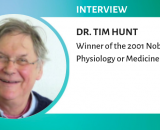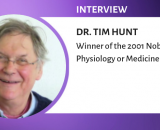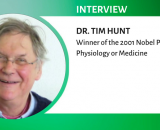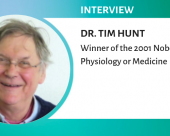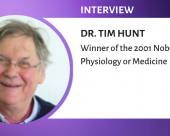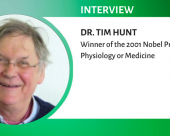The most difficult aspect of research is to find a good problem to work on, says Dr. Tim Hunt
Interview with Dr. Tim Hunt
It is not every day that you get to chat with a Nobel Laureate, so when you do, it’s bound to be special! Catch this interesting interview series with Dr. Tim Hunt conducted by Clarinda Cerejo, Editor-in-Chief, Editage Insights. Through cheerful anecdotes, a characteristically witty humor, and friendly advice, Dr. Hunt narrates his experiences around winning the Nobel Prize and describes how the event changed his life. He also provides some valuable advice for aspiring researchers by sharing some of his experiences as a scientist.

Dr. Tim Hunt is renowned for his work on cell cycle regulation for which he won the 2001 Nobel Prize in Physiology or Medicine along with Dr. Lee Hartwell and Dr. Paul Nurse. Dr. Hunt discovered cyclins, proteins that are crucial for mitosis and other cell cycle transitions. Before this, the focus of Dr. Hunt’s research was on the control of haemoglobin synthesis in red blood cells. After a long and successful academic career that culminated with him as a principal scientist at the Imperial Cancer Research Fund (now Cancer Research UK), Dr. Hunt is currently retired.
In the first segment of our interview, I asked Dr. Hunt to share his experience winning the Nobel Prize. In this segment, I talk to him about his research and get him to share how he developed an interest in biology at an early age. According to Dr. Hunt, in order to be successful, a researcher should be able to identify a "good" research question that people would be interested in finding an answer to. Timelines are equally important; researchers cannot afford to spend too much or too little time on their work. Dr. Hunt also advises researchers to be completely sure of what they are doing, even if they need to be the harshest critics of their own work.
Dr. Hunt, could you tell us a little bit about your work? What sparked your interest in biology in general, and cell cycle control in particular? If you could share any anecdotes from your schooling years or about your interest in biology, that would be great!
I guess I always wanted to be a scientist for as long as I can remember, but biology happened by chance! I was about 11 or 12 years old when I did very well in a biology exam at school. I think I was ranked 13th or 14th among all the students in the whole school. That was when I realized that I was good at biology, but I didn’t particularly like or enjoy it. I mean I really would have loved to become a physicist or an engineer because I enjoyed fiddling with old radio sets and making things and stuff. But I wasn’t very good at that. So the discovery that I was good at biology launched me on a career path in this field. After that, it was just a matter of clearing various exams.
I think another motivating factor was having good teachers. I had an excellent chemistry teacher who simplified chemistry for me when I was in 6th grade. Also, most people studying biology and/or chemistry became biochemists because that was sort of what you did in the late ‘50s. I, along with two classmates, pursued biochemistry and we ended up as biochemists. It was somehow obvious to us that biochemistry was the “in thing” that everybody wanted to follow. I mean, we sort of sensed that what we would now call molecular biology was just around the corner.
I then went to Cambridge with my two classmates and we loved it there! For example, we had a physiology course where we conducted many experiments on cells and that complemented my invertebrate zoology course that compared how organisms deal with the various challenges they face. It was highly interesting to compare human physiology with insect physiology or snail physiology. The people who taught us that course had a very strong philosophical approach. (In fact, one of course instructors had also taught Jonathan Miller. Incidentally, I ran into Miller once and we got talking. Miller did a marvelous imitation of one of our teachers who had a particularly imitable voice. Those were good times!)
During our first supervision in zoology, we were asked what we wanted to do after college. The three of us didn’t have an answer to this, and we shyly said, “Oh please sir, we would like to do research.” But we didn’t really know what research actually meant. We just thought it was romantic. The interesting thing is that we didn’t seriously worry about whether there was a career in research. I think we had faith that things would fall in place, which turned out to be roughly right. This was a leap of faith more than anything else. It’s interesting, because today, researchers worry much more about whether they can build a career in research. Back then, research was an ambition. Today, it’s much more than that.
How did you venture into cell cycle research?
I think my career is the result of a series of lucky breaks.
Biochemistry was a great choice for me and my contemporaries because there were many discoveries waiting to happen in that field, and it looked like so much fun that we went for it. It was a long time before I started being a cell cycle researcher. In retrospect, I don’t think I would have imagined myself getting into something as specialized as cell cycle research. In my early years, I didn’t even know what the cell cycle was!
My ignorance lasted until I started working on sea urchin eggs, when I realized that they actually divided. Around the same time, I attended a seminar by John Gerhart, a Berkley professor, who spoke about this magical stuff called “MPF” or Maturation Promoting Factor, which appeared when phagocytes underwent maturation in response to progesterone. The way he described it made it very clear that this was something that appeared to be a key regulator of the cell cycle and we didn’t know what it was yet. MPF was very hard to purify, but I wanted to attempt purification nonetheless. Although I had never purified anything thus far, my research on the sea urchin and Gerhart’s seminar sparked my interest, and I began to think about cell division.
One summer, while I was at the Woods Hole Oceanographic Institution, we began to think about whether sea urchins had MPF. We know that starfish have MPF, so why not sea urchins? We unsuccessfully went about planning an assay to find MPF in sea urchins. It was technically too challenging. So even though my research focus was different—I was studying the control of protein synthesis—cell cycle research caught my attention by sheer chance.
Before studying cell cycle research you worked on haemoglobin synthesis. Could you tell our readers more about that?
Interestingly, I started working on hemoglobin synthesis, too, by chance. During my graduate years at Cambridge, I attended a talk on haemoglobin by Vernon Ingram. This talk interested me deeply and eventually led me to study how haeme controlled hemoglobin synthesis, which was actually one of the areas of Ingram’s research. I was also lucky because Asher Korner, my supervisor, encouraged all his students to find their own research questions and work on the topic they liked. The only requirement was that we had to study it in our lab. And luckily for me, my lab mate Louis Reichardt, as part of his undergraduate project, had learned how to make rabbit reticulocytes, which were a prerequisite for my experiments on hemoglobin synthesis.
Later, a fellow student Tony Hunter and I started working on the question of whether ribosomes formed queues when there wasn’t enough haeme. Ingram had proposed that ribosomes formed a queue. Theoretically, the proteins would create a pocket for the haeme to fit in. But if the haeme was insufficient or absent, they would wait until the pocket was filled and then go on. We wanted to find out how the ribosomes knew whether the pocket was filled. Although the question sounded radical, we discovered that the theory itself was incorrect—ribosomes didn’t form a queue at all. We did consider the probability of our methods not being sensitive enough to detect a queue, so we thought of ways of deliberately causing queues. Eventually, we were able to prove that if we studied this expecting to find a queue, then that was exactly what we would see. Our methods were fairly crude but today’s technology helps answer such questions more accurately. In any case, we were successful in refuting the queue hypothesis.
Later on in my career, I caught another lucky break: One day, I returned to the lab after a long lunch break and discovered that I had forgotten to turn the centrifuge off. This blunder led to the discovery that alpha chains are made on smaller polysomes than beta chains. This was also our first Nature paper. I must mention that, in this case, even though we made an interesting discovery, we got the explanation wrong because I failed to perform a rather obvious elementary control experiment. We were later corrected by Harvey Lodish.
Through my experience, I learned that you only make discoveries when you are sort of stumbling and bumbling about, turning over stones at random. Making small mistakes in experiments is fine, because you stand a chance of making startling discoveries. If you stick to a very narrow path, then you’ll probably simply conform to what other people already know, whereas the purpose of research is to try and discover something new that nobody knows. But during the course of my research on haemoglobin synthesis I also realized that biochemistry is all about getting the smallest technical details right, because if you don’t get them right, you can’t even begin.
That’s really interesting, Dr. Hunt, the way you view your career as a series of lucky breaks and how you used your learnings along the way. I guess every successful researcher goes through the same process—getting some things right, making some mistakes, learning from them, and improvising. But when you say that the purpose of research is to work on something new, we come to the point of choosing a research question. What are some of the challenges researchers face when finding the right problem to work on?
I agree that choosing a research question may be difficult and a researcher can’t always rely on luck. Over the years, I have come to realize that the most difficult aspect of research is to find a good problem to work on. It’s really hard to find (a) an interesting problem, (b) an important problem, (c) a problem that people will be interested in knowing the answer to, and (d) a problem that can actually be solved. A researcher also has to be mindful of timelines. We are not talking about a trivial problem you could solve overnight nor are we talking about something that would go on forever, beyond your lifetime. In principle, you want to have larger problems that you can break down into smaller problems and solve those smaller issues during the period of a grant application of about 3 to 5 years. For instance, I started working on the haeme problem in 1968 on a fulltime basis and we solved it in 1975: it took us around 7 years of research to solve our problem. But we knew that it was a problem that had a solution.
I also remember that when we started out, we had to do a lot of background work to understand exactly how we would proceed and I guess that is common. Another thing that happened is that we kept being sidetracked from the main problem. Studying controls gave us a lot of fresh insight into other related mechanisms. Along the way, I also discovered that when your results challenge already established or accepted studies, you face a harder time from many people, including journal reviewers. This is the reason why you have to be completely sure of your results even if this means that you have to be your own harshest critic. That is better than having someone else question you or shoot your work down.
Read the other two segments of our interview with Dr. Tim Hunt:
Published on: Sep 29, 2015
Comments
You're looking to give wings to your academic career and publication journey. We like that!
Why don't we give you complete access! Create a free account and get unlimited access to all resources & a vibrant researcher community.




